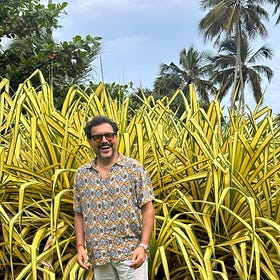5x3x5 : Books X Concepts X Action Points
Issue #156
Books have always influenced our thought process and given us direction with the wisdom in them. In this issue of Good Vibes I am sharing the 5 books that has influenced a lot my life and given it a direction. 3 Key Concepts in each of them with 5 actionable items and my biggest takeaway.
"Four Thousand Weeks" emphasizes making conscious choices about priorities and focusing on the present moment rather than trying to do everything.
"From Strength to Strength" advocates for shifting focus to what truly matters as we age and making deliberate choices about how to spend our time and energy.
"Tiny Habits" is entirely built around the concept of starting with small, easy-to-do behaviours to build lasting habits.
"It Takes What It Takes" promotes neutral thinking and focusing on controllable factors, which involves making deliberate choices about how we respond to situations.
"Stillness is the Key" encourages cultivating inner calm through intentional practices like limiting information inputs, simplifying life, and focusing on the present moment.
👉 "Four Thousand Weeks" by Oliver Burkeman offers a philosophical and practical approach to time management, focusing on embracing the finite nature of human life.
Key Concepts:
Life is short - we only have about 4,000 weeks on average.
Traditional productivity advice often fails to address the fundamental limitations of time.
Accepting our finite time can lead to more meaningful and joyful lives.
Strategic Actionable Items:
Embrace your limits
Accept that you can't do everything
Make conscious choices about what to focus on and what to neglect
Stop beating yourself up for not getting everything done
Adopt a "limit-embracing" attitude
Organise your days with the understanding that you won't have time for everything
Focus on what truly matters to you
Let go of the impossible goal of "getting on top of everything"
Choose what to fail at
Decide in advance which areas of your life you're willing to let slide
Focus your energy on your most important priorities
Pay yourself first with time
Allocate time for your most valued activities before dealing with other demands
Do something that matters to you every day, even if it's just for a short time
Limit your work in progress
Focus on a small number of important tasks at a time
Resist the urge to start new projects before completing current ones
Cultivate patience. Allow things to take the time they need. Practice ‘doing nothing’. Confront your finite time regularly. Reflect on your mortality to help clarify what's truly important
👉 "From Strength to Strength" by Arthur C. Brooks offers insights on finding success, happiness, and purpose in the second half of life.
Key Concepts:
Professional decline occurs earlier than expected, but this can be an opportunity for growth.
There are two types of intelligence: fluid (declines with age) and crystallised (increases with age).
Redefining success is crucial for happiness in later life.
Strategic Actionable Items:
Embrace the "Second Curve"
Recognise that your skills and strengths change with age
Shift from relying on fluid intelligence to crystallised intelligence
Seek roles that leverage your accumulated knowledge and experience, such as mentoring or advisory positions
Redefine Success
Focus on "eulogy virtues" (character, relationships) rather than "résumé virtues" (achievements, titles)
Prioritise happiness and fulfilment over career achievements and material wealth
Cultivate Meaningful Connections
Invest time and energy in building and maintaining relationships
Embrace interconnectedness with others
Recognise that healthy relationships are crucial for well-being as you age
Practice Detachment
Let go of attachments to worldly possessions and rewards
Pare down possessions to essentials
Focus on what truly adds value to your life
Develop Spiritual Growth
Embrace spirituality or philosophical practices that provide meaning
Use spiritual practices to cope with life changes and find purpose
Shift focus from personal achievement to helping others. Practice Wisdom-Oriented Activities. Consider roles such as teaching, mentoring, or consulting.
👉 "Tiny Habits" by BJ Fogg presents a revolutionary approach to behaviour change and habit formation.
Key Concepts:
Behaviour change occurs when motivation, ability, and prompt converge (B=MAP model).
Small, easy-to-do habits are more effective than large, ambitious goals.
Emotions, not repetition, create lasting habits.
Actionable Items:
Implement the Tiny Habits Formula
Find an anchor moment (existing routine or event)
Design a tiny behaviour (less than 30 seconds to complete)
Celebrate immediately after performing the behaviour
Use the "After I... I will..." Recipe
Create habit recipes: "After I [anchor], I will [tiny behaviour]"
Example: "After I brush my teeth, I will floss one tooth"
Focus on Golden Behaviours
Identify high-impact, easy-to-do behaviours
Use the Focus Mapping technique to visualise and select these behaviours
Scale Back Existing Habits
Make desired behaviours as small and easy as possible
Example: Instead of journaling for 30 minutes, start with writing one sentence
Design Effective Prompts
Attach new habits to existing daily routines
Use visual cues or reminders in your environment
Cultivate a Growth Mindset. Apply Tiny Habits to Break Bad Habits. Transform irritants into prompts for positive behaviours. Example: Use a traffic jam as a cue to practice deep breathing
👉 "It Takes What It Takes" by Trevor Moawad presents a powerful approach to mental conditioning and achieving success.
Key Concepts:
Neutral thinking is more effective than positive or negative thinking
Mental conditioning significantly impacts physical performance
Success requires consistent, disciplined actions and behaviour
Actionable Items:
Adopt Neutral Thinking
Focus on facts and reality without emotional judgment
Practice the four-step process: Identify, Label, Reframe, and Repeat
Apply neutral thinking to everyday situations and challenges
Eliminate Negative Self-Talk
Identify and consciously stop negative internal dialogue
Replace negative thoughts with neutral, fact-based statements
Use language that empowers and propels you forward
Visualise Performance, Not Outcomes
Focus on the process and actions required for success
Mentally rehearse specific behaviours and techniques
Use visualisation to prepare for challenges and improve performance
Create a Winning Environment
Surround yourself with positive influences
Curate a supportive framework that aligns with your goals
Minimise exposure to negativity in your surroundings
Embrace the Mind-Body Connection
Recognise how your mental state affects physical performance
Practice techniques to manage physiological responses under pressure
Develop mental discipline to maintain control in high-stress situations
Make Hard Choices. Develop Consistency and Discipline. View setbacks as opportunities for growth. Learn from failures and use them to improve. Focus on controllable factors
👉 "Stillness is the Key" by Ryan Holiday presents a compelling argument for cultivating inner calm and clarity in our chaotic world. Here's a synopsis with strategic actionable items:
Key Concepts:
Stillness is a state of mind that leads to clarity, insight, and better decision-making.
Achieving stillness requires balancing the mind, body, and soul.
Ancient wisdom and modern examples demonstrate the power of stillness in various aspects of life.
Actionable Items:
Cultivate Mental Stillness
Limit information inputs to reduce mental clutter
Practice mindful consumption of news and media
Develop a journaling habit to process thoughts and emotions
Embrace Solitude and Silence
Create regular moments of solitude in your daily routine
Engage in silent reflection or meditation practices
Disconnect from technology periodically to reduce distractions
Develop Physical Stillness
Prioritise quality sleep for overall health and mental clarity
Engage in regular physical exercise, including walking
Practice deep breathing exercises to calm the body and mind
Nurture Spiritual Stillness
Cultivate gratitude for what you have
Practice letting go of things beyond your control
Engage in activities that bring you a sense of purpose or meaning
Simplify Your Life
Declutter your physical and digital spaces
Focus on essential tasks and relationships
Learn to say "no" to commitments that don't align with your priorities
Embrace the Present Moment. Balance Ambition with Contentment. Define what "enough" means to you in various aspects of life. Simplify your life by decluttering and focusing on essentials.
All these books, in their own way, suggest that significant life improvements come not from grand, sweeping changes, but from small, deliberate actions and choices made consistently over time. They all advocate for a more mindful, intentional approach to life, focusing on what's truly important and taking small steps towards those priorities.
And before you go, Wishing you a safe, joyous, and prosperous Diwali! As the festival of lights illuminates our homes and hearts, I extend my warmest wishes to you and your loved ones on this auspicious occasion of Diwali. May the glow of diyas brighten your path, and the spirit of the season fill your life with joy, prosperity, and new beginnings.
In case you missed previous issue on Life in 50s, here are the highlights:
Shift in Perspective: Aging provides a rich tapestry of experiences that enhance our ability to navigate challenges. Regular mindful reflection helps us recognize our growth and apply our wisdom to current situations.
Emotional Intelligence: With age comes greater emotional insight. Conducting an emotional intelligence audit can help identify strengths and areas for improvement, allowing us to better manage our emotions and relationships.
Professional Opportunities: Our accumulated work experience is invaluable. Creating a skills inventory can reveal opportunities for career advancement, transitions, or consulting roles based on our expertise.
Lifelong Learning: The world is constantly evolving, and embracing new skills keeps our minds sharp. Committing to continuous learning—whether through online courses or local classes—can enhance cognitive function and confidence.
Meaningful Connections: Nurturing relationships becomes increasingly important as we age. Making a conscious effort to cultivate our social circles and engaging in community activities can significantly boost our happiness and well-being.
Life on the other side of 50s
Today, we're diving into a topic that's close to many of our hearts: thriving in the second half of life. Contrary to societal myths about aging, the years beyond 50 can be some of the most rewarding and productive of our lives.
Before you go!
Did you like this issue? If yes, consider dropping your love on the socials and sharing it with anyone who you think will benefit from it.
See you on the forty fourth Sunday of 2024. Take care!




